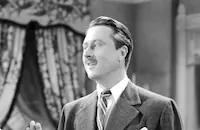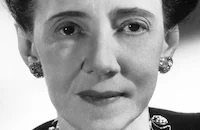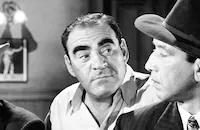My Sister Eileen

Brief Synopsis
Cast & Crew
Alexander Hall
Rosalind Russell
Brian Aherne
Janet Blair
George Tobias
Allyn Joslyn
Film Details
Technical Specs

Synopsis
Anxious to help her pretty sister Eileen, an aspiring actress, Ruth Sherwood, a reporter for the Columbus, Ohio Courier , writes a glowing review of Eileen's performance before the play in which she is appearing opens. Consequently, on opening night, when Eileen is replaced by another actress and the Courier runs the review, Ruth is fired. Grandma Sherwood, the sisters' sympathetic grandmother, urges Ruth to travel to New York to advance her writing career, and when Eileen insists on accompanying her sister, the girls's father, Walter Sherwood, reluctantly gives them $100 for their journey. Shocked by the high cost of New York rent, the sisters are talked into renting a Greenwich Village basement apartment by the building's landlord, Appopolous. As they hand over the rent, an explosion rocks the building, and Appopolous explains that workmen are blasting nearby to build a subway tunnel. That night, in the sweltering heat, the girls leave their window open and are harassed by a pair of drunks ogling them from the sidewalk above. When Lonigan, the local constable, chases away the drunks and warns the sisters to stop causing disturbances, Eileen bursts into tears. The next day, while seeking employment at the Wallace Theatrical Production office, Eileen meets reporter Chic Clark, who asks for an interview in order to pursue the pretty actress. Meanwhile, Ruth goes to Manhatter magazine in search of a job. There, Robert Baker, the magazine's editor, is criticizing Ralph Craven, the magazine's owner, about his outdated policies. To prove his point, Robert asks Ruth's opinion, and when she echoes his criticisms, Ruth and Craven argue and she runs out of the office, leaving behind her manuscript. Intrigued, Robert finds Ruth's address on the manuscript and decides to pay her a visit. Upon returning home, the discouraged Ruth learns that Eileen has invited drugstore clerk Frank Lippincott to dinner. After a drunken man searching for Effie Shelton, the apartment's former tenant and resident psychic, wanders in, Eileen summons their neighbor, "The Wreck" Loomis, a burly football player, to throw him out. Wreck then asks if he can sleep in their kitchen while his mother-in-law, Mrs. Wade, who is unaware that her daughter Helen is married, comes to visit. Soon after Lippincott arrives for his "intimate" dinner, Chic knocks at the door, looking for Eileen. Next, Wreck joins the party, followed by a man carrying the unconscious Effie, whom he plants on a couch. Robert then comes to the door, declares that he has read Ruth's manuscript and invites her to dinner. Over their meal, the loquacious Robert convinces Ruth to use her talents and write about her eccentric life in New York. Ruth takes his advice, and when she presents her completed story, titled "My Sister Eileen," to Robert, he wants to publish it immediately. When Craven rejects the article, however, Robert announces that he is quitting after the next issue comes out. As Effie, Wreck, Helen and her mother converge at the sisters' apartment, Effie lets slip the fact that Helen and Wreck are married, much to Mrs. Wade's dismay. Soon after, Ruth's spirits are restored when a call comes from Chic's paper, sending her to Brooklyn to cover a story about the docking of the Portuguese Merchant Marine fleet. After Ruth hurries to Brooklyn, Chic appears at the apartment and admits to Eileen that the assignment was a ruse so that he could be alone with her. As Chic makes unwelcome advances to Eileen, Robert arrives, rescues Eileen and invites her and the absent Ruth to dinner that night to celebrate quitting his job. After Robert leaves, Ruth runs into the apartment followed by a pack of Portuguese Merchant Marines. When the sisters form a conga line to lure the sailors outside, Eileen creates a commotion on the street and is jailed for disturbing the peace. The next morning, Grandma and Mr. Sherwood come to visit the sisters, and as Ruth tries to conceal Eileen's predicament, Wreck and Helen interrupt with news that they have gotten married again for the sake of Helen's mother and Helen blurts out that Wreck had been living with the sisters. Next, Eileen, escorted by the Merchant Marines, arrives at the apartment and the commander presents her with a medal for spending the night in jail. Mortified, Mr. Sherwood insists the sisters return home and leaves to buy them railroad tickets. As Ruth packs her suitcases, Robert comes to the door, brandishing her story in the newest issue of the Manhatter , and gives her with a check for $250. After Appopolous appears and declares that the blasting has ended, Ruth signs a six-month lease for the apartment and, when her father returns, announces that she plans to stay in New York. Craven then arrives and offers Ruth a contract for her "Eileen" stories. She consents on the condition that he introduce Eileen to some of his theatrical producer friends. As they all leave the apartment to celebrate, three workmen drill through the floor from the subway tunnel below.

Director

Alexander Hall
Cast

Rosalind Russell

Brian Aherne

Janet Blair

George Tobias

Allyn Joslyn

Grant Mitchell

Gordon Jones

Elizabeth Patterson

Richard Quine

June Havoc

Donald Macbride
Frank Sully

Clyde Fillmore

"miss" Jeff Donnell
Minna Phillips
Charles La Torre
Danny Mummert
Don Barclay
Bert Roach
Armand Wright
Chick Chandler
Adia Kuznetzoff
Almira Sessions
The Three Stooges
George Travell
Tito Renaldo
George Adrian
Kirk Alyn
Tom Lincir
Chavo De Leon

Ann Doran
Peggy Converse
Bob Stevens
Jack Gardner
Ed Laughton
Hallene Hill

Forrest Tucker
Lewis Howard
Phyllis Kennedy

Charles Halton

Arnold Stang
Robert Elliott
Ed Gargan
Edward Dunn
Pat Lane

Ralph Dunn

Walter Sande
Douglas Leavitt
Richard Bartell
Crew
Fay Babcock
Lionel Banks
Jerome Chodorov
George Cooper
Joseph Fields
Max Gordon
Franklin Heller
Viola Lawrence
William Mull
Cary Odell
M. W. Stoloff
Joseph Walker

Photo Collections
Videos
Movie Clip




Hosted Intro
Film Details
Technical Specs

Award Nominations
Best Actress
Articles
My Sister Eileen (1942)
Russell shot to stardom playing another journalist in Howard Hawks' His Girl Friday (1940) costarring with Cary Grant. As Hildy Johnson, she pioneered the role of the smart and sassy career woman; her expert portrayal of an independent spirit led film analyst Marjorie Rosen to conclude, "Never for a moment does an audience doubt that she can't manage all by herself." Indeed, Russell was very comfortable being in charge in front of the camera; in her autobiography Life Is a Banquet, published shortly after her death in 1976, she describes the relationship between her and co-star: "Janet Blair, the girl who was cast as Eileen, started trying to upstage me. She was new and nervous, the same way I'd been when I started, so I invited her into my dressing room and delivered a short speech about the inadvisability of the course she'd embarked on. 'Look,' I said, 'you're not going to steal the picture from me because I've got the better part, the sympathy comes to me. And you're not going to get anyplace with what you're doing. I know all those old tricks. When you upstage me, all I do is turn my back on the camera, and then they have to come around on me full-face for my close-up.'" When the seasoned pro offered to then instruct her young tutor how to deliver an effective performance, an astonished Blair thanked her profusely for her kindness, to which the brassy Russell responded, "I'm not doing it because I like you, I don't know anything about you. I'm doing it to get a good picture." Direct and to the point: very fitting of the woman who once declared, "Acting is standing up naked and turning around very slowly."
Russell earned her first Oscar® nomination in the Best Actress category for her role in My Sister Eileen. Of the nomination she commented, "Glad as I was about it, the honor put me under heavy pressure. It means too much to the studios to have their people win; I still can't think about the tension surrounding those races without breaking into a sweat." She didn't have to sweat for long; she lost to Greer Garson for Mrs. Miniver (1942), the sentimental favorite that year. It would be the first of four nominations for Roz.
On a tragic note, the real Eileen McKenney died only four days before the Broadway opening. She was in a deadly car accident that also claimed the life of her husband, screenwriter and novelist Nathanael West, who is best known for his 1939 novel The Day of the Locust and later the 1975 film adaptation. Her memory, however, was kept alive through not only the play and the 1942 film: Russell starred in a musical version of My Sister Eileen rechristened Wonderful Town that opened on Broadway in 1953 and earned the actress a Tony award for her performance. In 1955, another version of My Sister Eileen was scripted and filmed, this time starring Janet Leigh, Jack Lemmon, and Bob Fosse. There was even a short-lived television series starring Broadway legend Elaine Stritch. But only the 1942 version has a surprise guest appearance in its final scene. Here's a hint: they were the kings of Columbia's comedy shorts - nyuk nyuk nyuk!
Producer: Max Gordon
Director: Alexander Hall
Screenplay: Joseph Fields, Jerome Chodorov, Ruth McKenney
Cinematography: Joseph Walker
Film Editing: Viola Lawrence
Art Direction: Lionel Banks
Music: Sidney Cutner
Cast: Rosalind Russell (Ruth Sherwood), Brian Aherne (Robert Baker), Janet Blair (Eileen Sherwood), George Tobias (Appopolous), Allyn Joslyn (Chic Clark), Elizabeth Patterson (Grandma Sherwood).
BW-96m.
by Eleanor Quin

My Sister Eileen (1942)
Quotes
Trivia
Notes
Ruth McKenney's stories, on which Jerome Chodorov and Joseph Fields based their play, were originally published in The New Yorker Magazine. According to a news item in New York Times, Columbia paid $225,000 for the screen rights to the property. Actors Richard Quine and Gordon Jones appeared in the Broadway production as well as the film. The Variety review adds that Franklin Heller, who worked as dialogue director on the picture, was the stage manager of the Broadway production. Max Gordon produced both the stage and screen versions. According to a New York Times news item, Sidney Buchman prepared the scenario from the screen adaptation written by Jerome Chodorov and Joseph Fields. The article states that Buchman expanded the relationship between "Ruth" and "Robert." Although Buchman is uncredited on the film, a comparison between the play and the film reveals that Ruth's meeting with Robert occurred much earlier in the picture. In addition, the scenes of Robert meeting Ruth in the Manhatter office and their subsequent dinner do not appear in the play. The New York Times article adds that the nationality of the foreign sailors was changed from Brazilian, as it was in the play, to Portuguese when the Brazilian government protested the depiction of the sailors.
This picture marked the screen debuts of Jeff Donnell and Kirk Alyn. Rosalind Russell was nominated for an Academy Award for Best Actress for her performance in the film. Russell also appeared in the July 5, 1943 Lux Radio Theatre version of the production. In 1955, Columbia produced a musical version of this film, titled My Sister Eileen and starring Betty Garrett, Janet Leigh and Jack Lemmon and directed by Richard Quine, who played the role of "Frank Lippincott" in the 1942 version. The Broadway musical Wonderful Town was also based on the Chodorov and Fields play, as was the December 2, 1958 CBS television production Wonderful Town, starring Russell and Jacqueline McKeever and directed by Mel Ferber. From October 5, 1960 to April 12, 1961 CBS broadcast a half-hour television series titled My Sister Eileen, starring Elaine Stritch and Shirley Bonne and directed by Oscar Rudolph.
















